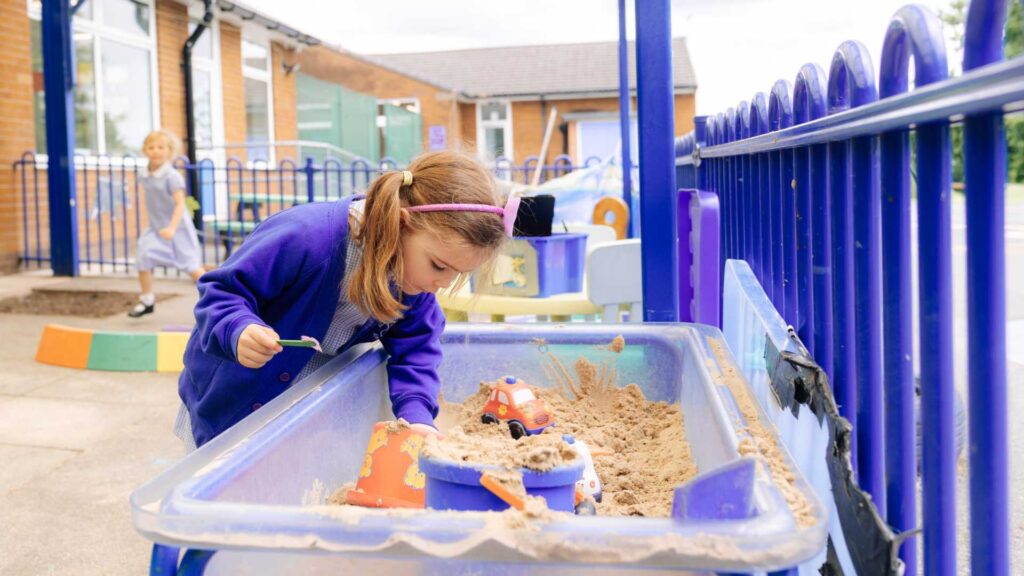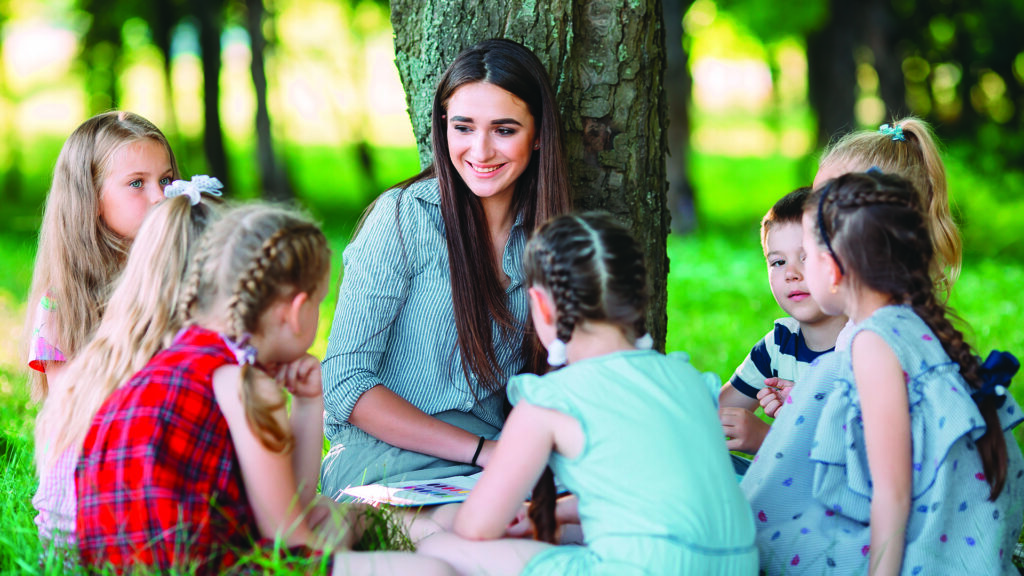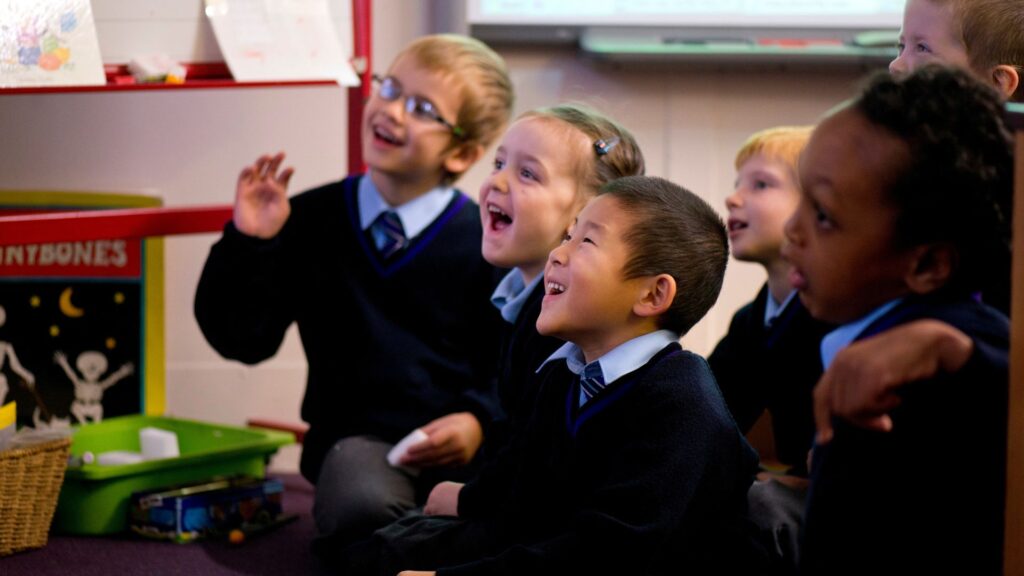Working and Teaching in the Early Years BA (Hons)
UCAS code: XX32
Learn about the principles of working with children from birth to seven years. Gain practical experience in different early years settings as you work towards a career in the early years sector.
Closed to applications.
Overview
| Course length: | 3 years full-time |
|---|---|
| Start dates: | September 2026 |
| Location: | Edge Hill University |
| Example offers: | BCC-BBC (A Level) or DMM (BTEC) |
| Subject(s): | Education and Teaching |
| Department: | Early Years Education |
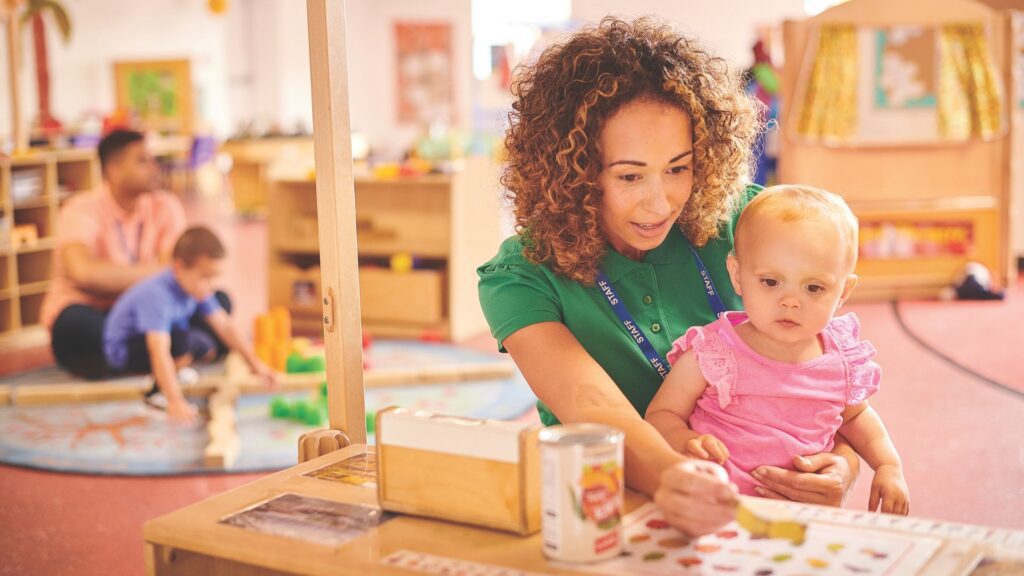
What children experience in their early years is crucial to their development. On our BA (Hons) Working & Teaching in the Early Years, you will explore how children learn and develop, gaining the skills to become an effective Early Years Education and Care Graduate, and making a lasting impact in the sector.
You will engage with current research and trends, while developing the personal and professional skills employers seek. Topics covered include arts and culture, disability, and language development, addressing the key challenges faced by practitioners.
Specialisation options include:
Special Educational Needs and Disabilities (SEND): Exploring inclusive strategies and personalised approaches to address the needs of children with learning difficulties, preparing for roles that enhance their development and opportunities.
Parent-Child Relationships: Examining ways to build effective partnerships with families, focusing on enhancing parent-child interactions to support children’s learning and development.
Pastoral Roles: Developing skills to promote children’s emotional and social well-being by creating nurturing environments and helping them navigate challenges with confidence.
Outdoor Learning: Studying how outdoor environments can support children’s development by helping them form meaningful connections with nature and the world around them.
Arts-Based Learning: Learning how to use the arts as a tool for children’s development, inspiring them to engage with cultural experiences such as music, theatre, and visual arts, while connecting with their cultural heritage and exploring broader perspectives.
In your final year, you will choose a research topic and optional module based on your specialisation.
Each year, you will complete bespoke placements in various settings, such as outdoor education, family support centres, early intervention services, and charities, ensuring practical, real-world experience.
The programme meets the Early Childhood Graduate Practitioner Competencies and satisfies DfE criteria for staff ratios in the Early Years Foundation Stage. This degree opens pathways to a rewarding career in early years education and care, including SEND, family support, and leadership roles.
By choosing this degree, you will gain the expertise to shape the future of the early years education and care sector.
Course features
-
International students can apply
-
Work placement opportunity
What you'll study
We’ll start the course by introducing you to key topics like the early years curriculum, the importance of play in early years teaching, and safeguarding. You’ll learn about theories of child development and explore different approaches to teaching and working with young children. You’ll have the option to see these in action in a real-life setting out on placement.
In Year 2, you’ll start to look at more advanced topics, like the relationship between language and learning for babies and young children, and how to adapt your teaching to be inclusive for children with special educational needs. You’ll also begin to identify areas of the subject that you’re particularly interested in that might be good candidates for further research. An optional work-focused module will help prepare you for your career after graduation.
You’ll advance to topics like leadership, international pedagogies, and the role of cultural experiences. Explore a subject of interest in further depth during your research project, and choose from optional modules that cover topics including autism spectrum conditions, music and its impact on learning, using technology to stimulate curiosity, and the practicalities of setting up a nursery.
How you'll study
You will learn through a combination of lectures, seminars, tutorials, work-based placements or work-related learning experience.
How you'll be assessed
You will be assessed through a combination of written assignments, presentations, portfolios, practice-based tasks and a research project.
There are no formal written examinations as part of the current assessment methods on this programme.
Who will be teaching you
This programme is delivered by experienced tutors who bring expertise across a wide range of areas. You will benefit from a rich learning environment that combines research-informed teaching with practical applications, supported by input from external experts to provide additional perspectives. Your development will be further enhanced through classroom discussions, personalised tutorials, and targeted individual sessions designed to strengthen your self-reflective skills and academic writing.
Where your course includes optional modules, these are to provide an element of choice within the course curriculum. The availability of optional modules may vary from year to year and will be subject to minimum student numbers being achieved. This means that the availability of specific optional modules cannot be guaranteed. Optional module selection may also be affected by timetabling requirements. Some restrictions on optional module choice or combinations of optional modules may apply.
Entry criteria
Typical offer 104-112 UCAS Tariff points, for which no specific subjects are required, plus GCSE English Language at Grade C or Grade 4 or above (or equivalent).
You should also be able to demonstrate experience of working with children aged from birth to seven years in any context.
If you accept a formal offer from Edge Hill University you will be required to apply for a Disclosure and Barring Service (DBS) Enhanced Disclosure indicating that you meet the mandatory criteria of ‘Clearance to Work with Children and/or Vulnerable Adults’. Further information will be sent to you after you have firmly accepted an offer.
Example offers
| Qualification | Requirement |
|---|---|
| A Level | BCC-BBC. |
| UCAS Tariff points | 104-112 points. |
| BTEC Extended Diploma (or combination of BTEC QCF qualifications) | Distinction, Merit, Merit (DMM). |
| T Level | Overall grade of Merit. |
| International Baccalaureate (IB) | We are happy to accept IB qualifications which achieve the required number of UCAS Tariff points. |
| Access to Higher Education Diploma | 45 credits at Level 3, for example 9 credits at Distinction and 36 credits at Merit or 15 credits at Distinction and 30 credits at Merit. The required total can be attained from various credit combinations. |
Please note, the above examples may differ from actual offers made. A combination of A Level and BTEC awards may also be accepted.
If you have a minimum of two A Levels (or equivalent), there is no maximum number of qualifications that we will accept UCAS points from. This includes additional qualifications such as Extended Project Qualification (EPQ), AS Levels that haven't been continued to A Level, and General Studies AS or A Level awards.
English language requirements
International students require IELTS 6.0, with a score no lower than 5.5 in each individual component, or an equivalent English language qualification.
If your current level of English is half a band, one band, or one-and-a-half bands lower, either overall or in one or two elements, you may want to consider our Pre-Sessional English course.
Fair Entry Criteria
Our new Fair Entry Criteria is a Contextual Admissions Policy that takes an applicant’s personal and educational background into account. This policy will allow eligible applicants to receive up to a two-grade reduction in their entry requirements for this course. Find out more and see if you qualify.
How to apply
Apply full-time
Read our guide to applying through UCAS to find out more about the application process.
International
Please see our international student pages for further information about how to apply as a prospective international student.
Should you accept an offer of a place to study with us and formally enrol as a student, you will be subject to the provisions of the regulations, rules, codes, conditions and policies which apply to our students. These are available at www.edgehill.ac.uk/studentterms.
If you join a full time undergraduate degree at Edge Hill University, we will guarantee you the offer of a room in our halls of residence for the first year of your course.
Discover our accommodation
Facilities
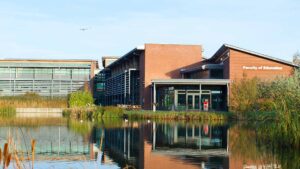
The Faculty of Education enjoys the enviable position of being one of the country’s leading providers of transformative education, training and research for the teaching and education workforce. Housed in a state-of-the-art £9m building, the Faculty of Education enjoys a stunning setting from both its lakeside and piazza buildings.
Facilities in the lakeside building include a 300-seat lecture theatre, five well-equipped ICT suites, and 18 teaching rooms complete with the latest technology.
Our nearby piazza building houses our Research Hub and our Secondary and Further Education department including a lecture theatre and a number of seminar rooms.
Where you'll study
Finance
Tuition fees
UK Full-Time
£9,535
a year
International
£17,000
a year
EU/EEA and Swiss students who have settled or pre-settled status under the EU Settlement Scheme, as well as Irish nationals, may be eligible for the UK tuition fee rate.
Financial support
Subject to eligibility, UK students joining this course can apply for a Tuition Fee Loan from the Government to cover the full cost of tuition fees. UK students enrolling on the course may also be eligible to apply for additional funding to help with living costs.
Scholarships
We offer a range of scholarships, which celebrate the determination, commitment and achievement of our students. Many of our scholarships are awarded automatically. There are some however, where you will need to be involved in an application or nomination process. To find out more about our scholarships and check your eligibility, please visit our dedicated scholarships pages.
Money Matters
Please view the relevant Money Matters guide for comprehensive information about the financial support available to eligible UK students.
EU/EEA and Swiss students who have settled or pre-settled status under the EU Settlement Scheme may be eligible to apply for financial support. Irish nationals can ordinarily apply to Student Universal Support Ireland (SUSI). If you are an EU student who does not have settled or pre-settled status, or are an international student from a non-EU country, please see our international student finance pages.
Your future career
We created this degree to help you find your path in the early years sector. If you know you want to work with children 0-7 but aren’t sure how, this is a great choice. We’ve worked with employers to make sure the course gives you the skills early years organisations are looking for. We’ll help you work towards a fulfilling career in destinations like:
- children’s centres
- day nurseries
- schools
- charities
- museums
- family support units
- local councils
- playgroups
Throughout your degree, you’ll have lots of contact with employers through placements and other opportunities. You’ll build good connections and have a clearer sense of which roles might be right for you.
If you decide to become a teacher, this course will help you prepare for the further training you’ll need to qualify. At Edge Hill we offer postgraduate teacher training courses that you might like to consider, including PGCE Primary Education with QTS and PGCE Primary Early Years Education with QTS.
